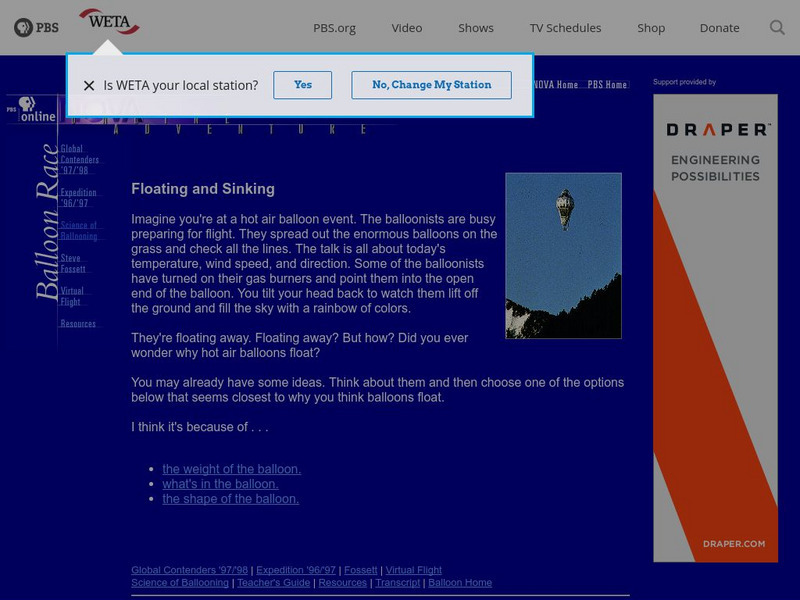PBS
Pbs Learning Media: New Confidence
This Wide Angle video looks at the reservations that a traditional Indian family had about their daughter taking a job in India's outsourcing industry.
PBS
Pbs Learning Media: Triangles: Designing a Straw Bridge
In this video segment adapted from ZOOM, the cast tries to design and build a bridge made out of drinking straws that will support the weight of 200 pennies. [4:02]
PBS
Pbs Learning Media: Acids and Bases: Cabbage Juice Indicator
In this video segment, the ZOOM cast demonstrates how to use cabbage juice to find out if a solution is an acid or a base.
PBS
Pbs Learning Media: Galileo: Timeline of His Life
This illustrated timeline from the NOVA Web site turns back the clock to the late 1500's to relive the dramatic life of one of the world's most renowned scientists.
PBS
Pbs Learning Media: On Human Cloning
Three cloning experts share their opinions of cloning in these interviews from NOVA: "18 Ways to Make a Baby."
PBS
Pbs Learning Media: Garden Spiders
In this video segment from Garden Insects, learn about six varieties of spiders that live in one garden. [2:40]
PBS
Pbs Learning Media: Floating and Sinking: Hot Air Balloons
Why do hot air balloons float? This resource from the NOVA Web site offers a series of interactive activities that illustrates the physics of hot air balloons.
PBS
Pbs Learning Media: On Fire
Learn about the chemical reactions that take place when things burn in this interactive activity from the NOVA Web site.
PBS
Pbs Learning Media: How Cancer Grows
Follow the growth of a carcinoma from initial mutation to widespread metastasis in this feature from the NOVA: "Cancer Warrior" Web site.
PBS
Pbs Learning Media: Riddle of the Bones
At the online companion Web site of "Evolution," the seven-episode series on PBS, piece together clues to how one of our early ancestors looked as you examine images from four significant fossil finds of Australopithecus afarensis.
PBS
Pbs Learning Media: Allopatric Speciation
These images from the Smithsonian Institution depict Nancy Knowlton's work with snapping shrimp in Panama. Knowlton found that the closing of the isthmus -- dividing the Pacific Ocean from the Caribbean -- resulted in new species of shrimp.
PBS
Pbs Learning Media: Mimicry: The Orchid and the Bee
In this photograph from Oxford Scientific Films, a horned bee attempts to mate with an Ophrys orchid, which has evolved to resemble a female bee.
PBS
Pbs Learning Media: Sex and the Single Guppy
Play in our streams and see how exhibitionism has an evolutionary payoff in this simulation of John Endler's famous experiment. Includes background information and discussion questions.
PBS
Pbs Learning Media: Social and Historical Perspectives of Dogs
Learn more about the theory that dogs evolved from wolves in this video from Nature. [5:03]
PBS
Pbs Learning Media: Greenland Ice Sheet Project 2: A Record of Climate Change
Using images and graphs, this interactive resource illustrates scientists' efforts to study Earth's climatic history for the last 250,000 years by drilling into the Greenland Ice Sheet and examining ice cores. Includes background reading...
PBS
Pbs Learning Media: A Cow's Digestive System
Learn how a cow eats and digests food in this video segment from Nature.
PBS
Pbs Learning Media: Tectonic Plate Movement in Alaska
In this video adapted from KUAC-TV and the Geophysical Institute at the University of Alaska, Fairbanks, learn how tectonic plate movement is responsible for building mountains, such as the Wrangell and St. Elias Mountains. 2m 16s
PBS
Pbs Learning Media: Ingredients for Life: Water
This video segment adapted from NOVA goes on a whimsical journey in search of life forms thriving in extreme conditions on Earth and in outer space. Animations show ice on Jupiter's moon, Europa, and signs that water once existed on...
PBS
Pbs Learning Media: Smart Bridges
In this video segment adapted from NOVA scienceNOW, learn about engineering innovations that could help detect a bridge's structural weaknesses before they become dangerous. [5:21]
PBS
Pbs Learning Media: Demolition Woman
Find out how controlled explosions are used to demolish multi-story buildings in this interview from the NOVA: "Kaboom!" Web site.
PBS
Pbs Learning Media: Is Lactic Acid a Four Letter Word?
This essay by exercise physiologist Patti Finke and fitness consultant Warren Finke describes the process by which our bodies transform food energy into energy that our cells can use.
PBS
Pbs Learning Media: Should We Grow Gm Crops?
Learn the pros and cons of genetically modified (GM) crops, and cast your vote on whether they should be grown. From the FRONTLINE/NOVA: Harvest of Fear Web site.
PBS
Pbs Learning Media: Night Vision
This interactive feature from the NOVA: "Leopards of the Night" Web site highlights the nighttime habits and abilities of a wide range of nocturnal creatures.
PBS
Pbs Learning Media: Egg: The Arts Show: Ben Hall of Sapelo Island
Short video from Egg: the arts show in which Sapelo Island resident, Ben Hall, guides viewers through an introduction to Sapelo Island, which is inhabited by the descendants of African slaves. This is one in a series of videos about...

